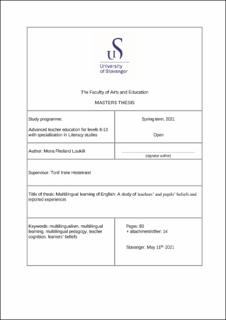| dc.description.abstract | This research project is a qualitative study examining the beliefs and reported experiences held by Norwegian upper secondary teachers and multilingual pupils. The pupils in this study had a different or additional first language than the majority language Norwegian. In today’s society multilingualism is an increasing phenomenon due to globalisation and migration, which has ultimately influenced Norwegian classrooms. For long, there was an assumption that pupils learn best if taught in the target language. However current research suggests the opposite, that pupils’ language learning and academic achievements will improve if they are allowed to use their whole language repertoire. Therefore, it is essential for teachers to implement multilingualism in the classroom, by creating an inclusive multilingual environment where all languages and cultures are welcomed. Furthermore, multilingualism is endorsed in LK20 and the Core Curriculum. Nevertheless, research suggests that teachers do not have the necessary competence needed to teach multilingually.
Therefore, through semi-structured interviews with four VG1 teachers and focus group interviews with eight VG1 multilingual pupils, this study aimed to examine the teachers’ and pupils’ beliefs and their reported practices and experiences about multilingual teaching and learning of English. Additionally, the aim was to examine the relationship between teachers’ and pupils’ beliefs and experiences concerning learning English multilingually. The findings from the interviews suggested that the teachers were positive towards multilingual teaching, however they had limited competence in how to enact it. Furthermore, the teachers expressed a desire to receive more training about multilingual teaching. The pupils’ beliefs suggested that they also saw the benefits of multilingualism, however they did not see the relevance of using their L1 in class. Furthermore, the practice reported by the teachers suggested that the majority of the teachers enacted an English only approach in the classrooms, as they had been taught that pupils learn best through the target language. The pupils’ reported experiences suggested that they did not use their L1 in class, only two of the pupils did so in order to comprehend tasks. Finally, the findings suggested that there existed a complex and dynamic relationship between teachers’ and pupils’ beliefs and experiences concerning multilingual learning of English. The results might suggest that pupils were influenced by the teachers’ English only approach and, at the same time, the teachers were influenced by the pupils’ beliefs, not wishing to include their L1 in class.
Three main implications were suggested: 1) that it is not enough to only include multilingualism in LK20, the teachers need to be adequately trained in how to teach multilingually, 2) policy makers need to enhance diversity through implementing multilingual strategies in the schools, and 3) the teacher training curricula need to have an enhanced focus on multilingualism in all aspects of the teacher training program so that student teachers are trained adequately in how to teach multilingually. | |
